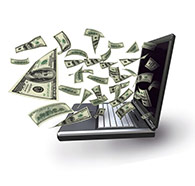НАВИГАЦИЯПОПУЛЯРНЫЕ СТАТЬИ
|
The latest data also revealed that the US` manufacturing industry that came off the relatively robust levels six months ago was yet to rebound. At a time when India`s export-oriented industries have been hit hard by weak global demand (exports contracted for the fourth straight month in March and posted a 67-month-low growth of -21.0%), the headline HSBC India Purchasing Managers` Index for the country for April released on Monday compounded policymaker`s worries as it fell to 51.3, down from 52.1 in March, on weak domestic orders. Although last week`s US Federal Reserve decision, guided by lower-than-expected first-quarter growth, is interpreted to show its lack of intent to raise borrowings costs until next year (something that could help emerging market economies), India`s own economic data barely reflect any sharp pick-up in aggregate demand. Even as the government, ostensibly laying emphasis on project implementation, is anxious to see investment activity decisively picking up, recent incremental data haven`t given it any comfort. 05.05.2015 11:56 Economic Growth And Russia`s Currency Economic growth in Russia continues to fall as exports and consumer spending decline. Investors, however, continue to buy the ruble as current economic weakness is priced in. In March, the economic growth figure came in at an annual pace of -3.4% contraction, down from the previous month`s reading of -2.3%, while also exceeding estimates for -2.0%. The economic growth measure is a monthly leading indicator reported by the Ministry of Economic Development. Since peaking at over 5% annual growth in 2012, economic activity has fallen sharply lower. Declining exports have been one of the largest weights on economic growth. In March, the export figure came in at an annual pace of -11.29% contraction, down from the previous month`s reading of -7.94%. After reaching over 30% annual growth in late 2011, exports have fallen significantly lower, to current levels. Export revenue to Russia has fallen in recent months as energy prices declined, alongside weaker demand from the global economy. Moreover, a steep decline in the country`s currency last year pushed price measures higher. In March, the inflation figure came in at an annual pace of 16.9%, up from the previous month`s reading of 16.7%, while also exceeding estimates for 16.8%. After starting 2014 at close to 6% annual growth, inflation measures have nearly tripled, seen below. Food and beverage costs are a large reason for elevated consumer prices. 04.05.2015 17:24 Russian Economy May Be Stumbling Back To Its Feet The Bank of Russia has cut interest rates for the third time so far this year, reinforcing forecasts by some government ministers that the country`s economic woes are beginning to stabilize. The central bank cut its key rate on April 30 to 12.5 percent, a reduction of 1.5 points, and said it would reduce it further - perhaps at its next board meeting on June 15 - as inflation cools down. The reason in part is to keep the ruble from rising too quickly in value, which would make Russian exports - notably oil and gas – more expensive on the world market. The ruble has been on a rollercoaster ride in the past several months because of the plunging price of oil and Western sanctions imposed on Moscow for its involvement in the crisis in neighboring Ukraine. The currency hit a record low against the US dollar in December, but was up by 13 percent compared with the dollar just before the Bank of Russia acted. This year began with an emergency rise in the key interest rate in January to help shore up the ruble. That evidently worked, and the central bank quickly lowered the rates in January and March to help cool off the quickly rebounding ruble. 03.05.2015 17:03 In what condition does the coalition government leave the UK economy? In what condition does the coalition government leave the UK economy? Needless to say, its members are fighting the general election on the proposition that they have done a fine job of rescuing the crisis-hit economy they inherited. It seems, at the moment, that this argument is not playing that well in the polls. Does it deserve to? Here is a scorecard. Let us start with the simplest measure of overall economic performance. In the last quarter of 2014, UK real gross domestic product per head was 4.8 per cent higher than it had been in the second quarter of 2010 when the coalition took office, and 6.2 per cent above the trough of the “great recession” in the third quarters of 2009. But it was much the same as in the first quarter of 2007 and below its pre-crisis peak. In the fourth quarter of 2014, real GDP per head was close to 16 per cent below where it would have been if the 1955-2007 trend had continued. Even the recovery has not shrunk this gap. This largely explains the disappointment over living standards. Moreover, this huge shortfall cannot be explained by a pre-crisis boom. On the contrary, the economy was close to its long-term trend in 2007. Booms had been far bigger in the early 1970s, late 1970s and late 1980s. Data on inflation tell much the same story. The argument that the UK economy was in a grossly unsustainable state in 2007 is largely ex-post rationalisation. Even house prices turn out not to have been unsustainably high. What nearly everybody missed was the vulnerability of the UK`s financial sector to a global crisis. 02.05.2015 13:24 Fitch predicts India`s GDP growth at 8 per cent in FY2015-16 Projecting an 8 per cent growth for the current fiscal, rating agency Fitch on Thursday said India is less vulnerable to risks from capital flight, on account of of drop in oil prices and the government`s reform agenda. India had previously been clubbed with Brazil, Indonesia, South Africa and Turkey for being the most at risk of capital outflows following US Federal Reserve`s proposed unwinding of the monetary stimulus. "India`s vulnerability has declined since 2013," Fitch said in a report. "A changing policy environment has had a positive impact on its macroeconomic risk profile." Fitch said two years ago, many emerging markets experienced some credit market and currency stress after the Fed discussed tapering of asset purchases. "Brazil, India, Indonesia, South Africa and Turkey - commonly referred to as the `Fragile Five` in 2013 - stood out at the time with the risk from capital flight resulting in currency volatility and widening credit spreads," it said. On India, it said: "The government`s broad-based reforms agenda, introduced following the 2014 general election, could transform the country`s business environment and investment climate." 01.05.2015 20:41 Is low growth the global economy`s new norm? In the 25 years before the Great Recession of 2008-2009, the United States experienced two brief, mild recessions and two strong, long expansions. Globally, incomes grew briskly; inflation abated; and stock markets boomed. Moreover, the recovery from the last major slump, in the early 1980s, brought about a quarter-century of unprecedentedly strong and stable macroeconomic performance. This time, however, the return to growth has been much more difficult. America`s recovery since the Great Recession, has been inconsistent, with growth repeatedly picking up and then sputtering out. In fact, the U. S. has not experienced three consecutive quarters of 3 percent growth in a decade. Though lower oil prices are helping consumers, this gain is partly offset by less energy investment, and the effects of the stronger dollar will be even larger. The U. S. is not alone. Though most European economies are now growing again, aided by lower oil prices and currency depreciation, the pace of expansion remains anemic. Similarly, Japan`s recovery remains fragile, despite strong efforts by the government. Even the major emerging economies, which were supposed to serve as global growth engines in the years ahead, are struggling: China and India have downshifted, and Brazil and Russia are contracting. When a boom or bust lasts for such a long time, it begins to seem like it will continue indefinitely. Six years after the crisis, some prominent economists are asking whether insufficient investment and/or waning gains from technological innovation have pushed the global economy into a “new normal” of lower growth and slow, if any, gains in living standards. Some economists call this “secular stagnation” - a fancy way of saying that the good times are gone for good. Are they right? 01.05.2015 13:33 The rouble: The worst is yet to come Russia`s currency, the rouble, had a terrible 2014. As oil prices collapsed and Western sanctions bit, export revenues slumped. Nervous investors pulled $150 billion from the country. As a result, the rouble lost about half its value against the dollar. But over the past few months, it has climbed out of its trough. Russian bonds and stocks have done well, too. The Central Bank of Russia (CBR) has been cutting interest rates - an unthinkable prospect just a few months ago. On April 30th it lowered its main rate from 14% to 12.5%. All this, some say, is proof that investors are too pessimistic about the Russian economy. They are wrong. Oil prices have risen slightly since the start of the year. That is helpful for an economy where the stuff provides half of all exports. The cheaper rouble has buoyed exports, too. A new deal to end the Russian-backed insurgency in Ukraine, signed in February, has also made investors less jittery. Nonetheless, the rouble`s strength is a puzzle, since in many ways the Russian economy looks worse than it did in December. Inflation, at 16.9%, is 5.6 percentage points higher, a jump that would normally spur depreciation. Real wages are tumbling fast. The foreign-exchange reserves of the CBR have fallen by about $30 billion so far this year, and by $130 billion since this time last year. The IMF thinks that the economy will shrink by 4% in 2015 - and it is a relative optimist. 30.04.2015 20:01 Inflation in Russia slowed to 16.5% in April 2015 Inflation in Russia, which, as polls show, is one of the biggest problems for the Russians, began to slow in April, after a significant acceleration of up to 16.8 and 16.9 percent year on year, respectively, in February and March. The rise in prices has decreased to 16.5 percent, as at 27 April and, according to official forecasts, it will continue to decline. “Amid ruble appreciation and a significant contraction in consumer demand in February-April 2015, monthly consumer price growth is declining and annual inflation is tending to stabilize,” the central bank said in the statement. According to the forecast of the Central Bank, inflation in Russia will drop to 8 percent in April 2016. The Bank of Russia also added that inflation is slowing down "faster than expected". In the previous forecast of the Central Bank predicted slowdown in inflation during the year to a level of 9 percent. According to various forecasts, inflation in Russia in 2014 will amount to 12 to 14 percent. The ruble`s collapse last year and Russia`s ban on some food imports in retaliation for sanctions over the conflict in Ukraine contributed to inflation more than doubling from the start of last year. The central bank`s medium-term inflation target is 4 percent for 2017. 30.04.2015 17:08 Ruble Is Seen as Overvalued to 63% of Economists After Rally The ruble is too strong after appreciating 14 percent in April, according to most of the economists surveyed by Bloomberg. Seventeen of the 27 analysts polled April 24-29 said the currency was overvalued, nine saw it near its “fundamental value” and one said it was still too weak. The ruble is staging its biggest monthly rally since 1993, buoyed by a cease-fire in Ukraine and a revival in the price of oil, Russia`s main export earner, as the peak of foreign debt repayment has passed. The ruble traded 0.1 percent weaker at 51.1120 against the dollar at 11:15 a. m. in Moscow. President Vladimir Putin has used the ruble`s recovery in 2015 to highlight the resilience of his country`s economy in the face of international sanctions over Ukraine and last year`s plunge in oil prices. Economy Minister Alexei Ulyukayev said April 17 that the currency`s “fundamental value” is close to 50 per dollar and predicted it would fluctuate around that level. “The ruble has not yet found its new equilibrium price,” Wolf-Fabian Hungerland, an economist at Berenberg Bank in Hamburg, Germany, said by e-mail. “We expect that the ruble will oscillate between 55 and 60 in the medium term.” Derivatives also suggest the ruble is more likely to weaken. There is a 48 percent probability of the currency depreciating 10 percent by June 30, and a 35 percent chance of a similar-sized gain, according to options data compiled by Bloomberg. The Russian currency tumbled 46 percent against the dollar last year before climbing 19 percent in 2015. |
Цитата дняБольшинство людей начинают интересоваться акциями, когда все остальные интересуются. Время интересоваться — это когда никто другой не интересуется. Вы не можете купить что-либо популярное и выиграть от этого. |




 07.05.2015 12:25 Economic Crisis Slows Putin`s Plans to Modernize Russian Military Russia`s economic crisis is forcing President Vladimir Putin to quietly scale back plans to build an “indomitable” military, even as Moscow readies one of the largest-ever displays of its might on Red Square this weekend. When Mr. Putin promised to spend more than 20 trillion rubles to modernize the military in late 2010—some $650 billion at the time—some senior officials questioned whether Moscow could afford it. Now left with fewer petrodollars and grappling with Western sanctions, the Kremlin is being forced to cut spending and delay other defense plans. The modernization project was aimed at replacing 70% of Russia`s armaments, much of which dates back to the Soviet era, with hundreds of modern tanks, guns, submarines and fighter jets. In turn, Russian military spending doubled between 2007 and 2013. Little information is publicly available about the defense expenditures, and where the cuts will fall isn`t clear. But even Mr. Putin has acknowledged that the dates for the modernization plan may need to be shifted. 06.05.2015 16:24 Global economy in stutter mode The world economy`s growth prospects for the current year seemed somewhat dented on Monday, with China`s manufacturing growth suffering the steepest drop in a year in April and the sector`s expansion easing from the March level in both the euro zone and India.
07.05.2015 12:25 Economic Crisis Slows Putin`s Plans to Modernize Russian Military Russia`s economic crisis is forcing President Vladimir Putin to quietly scale back plans to build an “indomitable” military, even as Moscow readies one of the largest-ever displays of its might on Red Square this weekend. When Mr. Putin promised to spend more than 20 trillion rubles to modernize the military in late 2010—some $650 billion at the time—some senior officials questioned whether Moscow could afford it. Now left with fewer petrodollars and grappling with Western sanctions, the Kremlin is being forced to cut spending and delay other defense plans. The modernization project was aimed at replacing 70% of Russia`s armaments, much of which dates back to the Soviet era, with hundreds of modern tanks, guns, submarines and fighter jets. In turn, Russian military spending doubled between 2007 and 2013. Little information is publicly available about the defense expenditures, and where the cuts will fall isn`t clear. But even Mr. Putin has acknowledged that the dates for the modernization plan may need to be shifted. 06.05.2015 16:24 Global economy in stutter mode The world economy`s growth prospects for the current year seemed somewhat dented on Monday, with China`s manufacturing growth suffering the steepest drop in a year in April and the sector`s expansion easing from the March level in both the euro zone and India. Автор:
Автор: 
 Комментарии: 0
Комментарии: 0 Просмотров: 20
Просмотров: 20


